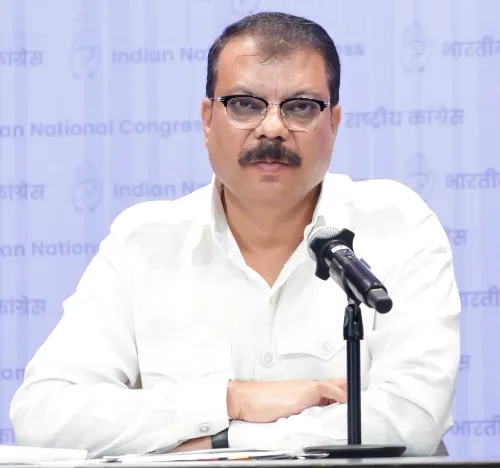Is FairPoint Exposing the Truth About Pak, Spies, and Rahul? -- Operation Sindoor Revealed

Synopsis
Key Takeaways
- Operation Sindoor reveals deep-rooted terrorism connections.
- Political reactions raise questions about national unity.
- Approximately 15 individuals arrested for espionage.
- Pakistan's support for terrorism is increasingly exposed.
- India demonstrates military might through precision strikes.
New Delhi, May 25 (NationPress) An apt metaphor for India’s Operation Sindoor against terrorism-supporting Pakistan is the 'Samudra Manthan'. In Sanatan Dharma, Samudra Manthan signifies the churning of the ocean to extract the nectar of immortality, symbolizing the eternal clash between good and evil, ultimately triumphed by the righteous.
Much like the mythological churning that yielded nectar for the virtuous, Operation Sindoor has unveiled revelations that are enlightening not just for India but also for the global community. It has laid bare Pakistan's deceitful role in terrorism and revealed individuals acting against India's security and interests.
As Pakistan faces scrutiny for harboring terrorism, numerous covert operatives within India are being unveiled one after the other. These individuals, all Indian citizens, have been secretly collaborating with Pakistan, relaying sensitive information.
Additionally, some political figures have made remarks that appear to undermine India’s anti-terror initiatives. Operation Sindoor, an unprecedented military endeavor, has indeed yielded astonishing outcomes.
The operation has identified individuals in India undermining the nation's security framework, leading to the arrest of around 15 men and women for espionage on behalf of the neighboring country. The suspects include a YouTuber, a security guard, a businessman, an app developer, students, and even regular citizens.
With nothing more than a mobile phone, these individuals captured and transmitted images, data, and other pertinent information related to defense establishments, religious sites, railways, airports, tourist attractions, or even arbitrary locales. For many, financial gain was the primary incentive, while honey traps were occasionally employed, with the constant demand for real-time and archived information.
The recruitment of these spies involved diverse methods: social media outreach, financial rewards, false promises, messaging applications, and even personal visits to Pakistan.
Most of the operatives belong to the 20-40 age demographic, with several being groomed as long-term assets. A notable example is YouTuber Jyoti Malhotra from Hisar, Haryana, boasting 3.85 lakh subscribers and having traveled to various countries, including Pakistan and China.
Earlier this year, she visited Pahalgam in Kashmir, where she filmed multiple videos.
Her case highlights how Pakistan is capitalizing on social media influencers for espionage against India. Since the inception of Operation Sindoor, a new face has been revealed almost daily—individuals who would have otherwise remained unnoticed.
While Operation Sindoor has brought to light these spies, it has also showcased unusual behavior from some political figures. Amid the ongoing operation, Congress leader Rahul Gandhi has persistently criticized the government, questioning how many Indian aircraft have been downed. He has denounced the ceasefire agreement between India and Pakistan and sought clarity on who initiated mediation.
Moreover, Gandhi has labeled New Delhi’s foreign policy as a failure, even while all-party delegations are touring 33 countries to present India’s case that Pakistan is a terrorist sponsor. He referred to Pakistan’s shelling in Jammu and Kashmir as a 'tragedy' rather than an act of terror.
Following his lead, other Congress leaders have made statements that have garnered applause from Pakistan. Congress president Mallikarjun Kharge described Operation Sindoor as a 'chutput yudh (small war)'.
These remarks have gained traction in Pakistani media and have been utilized by its establishment to criticize India on international platforms.
Why Rahul Gandhi chooses to make such comments while the nation is engaged in counter-terror operations raises questions. While scrutiny is vital in a democracy, the timing and intent of such remarks are crucial.
Operation Sindoor, a successful military campaign initiated on May 7 in retaliation for the April 22 Pahalgam terror attack, targeted nine terrorist bases in Pakistan and was executed by India’s tri-services.
This operation demonstrated India’s military capabilities and Pakistan’s ongoing support for terrorism.
The precision strikes targeted only terrorist bases, avoiding civilian and military casualties, thus highlighting India’s strategic intent and capabilities. However, Pakistan retaliated with a nefarious strategy, deploying swarms of drones into Indian territory and shelling residential districts in Jammu and Kashmir.
On May 10, in response, India obliterated 11 Pakistani airbases, leaving its military and government in shock. Reports indicate that even some of Pakistan’s nuclear facilities may have sustained damage during these airstrikes.
Faced with severe destruction, Pakistan quickly requested a ceasefire.
This operation has instilled a renewed confidence among the Indian populace and astonished the international community.
Pakistan’s role in terrorism has been thoroughly exposed, revealing its alignment with terror. From attending the funerals of terrorists to granting them state honors, Pakistan’s establishment has, for the first time, showcased its extensive terror network.
Operation Sindoor has compelled Pakistan to unveil its true nature—demonstrating its intention to foster terrorist operations and disseminate extremism not only in India but worldwide.
Just as the mythological Samudra Manthan led to significant gains, so too has Operation Sindoor—revealing truths that are sometimes harsh yet overwhelmingly positive and encouraging.
(Deepika Bhan can be contacted at deepika.b@ians.in)









